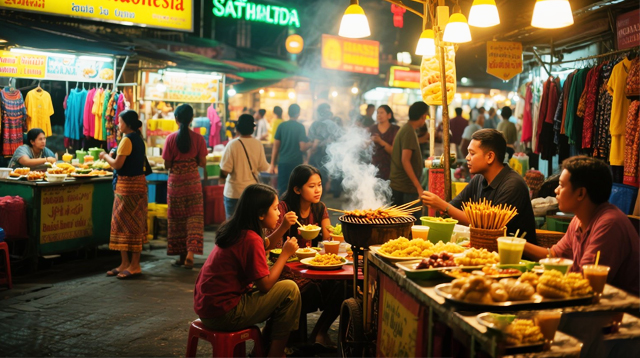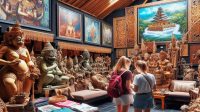PASAR Senggol, phrase familiar to Indonesians, is not simply a place for transactions, but a social and cultural phenomenon that represents the pulse of local life. Named “senggol” because of the dense crowds of visitors who often rub shoulders, this market offers an authentic and captivating experience, especially for lovers of food and tradition.
What is Pasar Senggol?
Literally, Pasar Senggol or night market is a people’s market that typically operates from the afternoon until evening, often occupying open areas, roadsides, or parking lots transformed into bustling hubs. Unlike traditional markets selling basic necessities in the morning, Pasar Senggol focuses on ready-to-eat culinary delights, snacks, and sometimes non-food products such as clothing or used goods. Its temporary nature and dominance by street vendors create a unique atmosphere—busy, lively, and full of enticing aromas.
In different regions, Pasar Senggol can have its own distinctive characteristics. In Bali, for example, Pasar Senggol in Klungkung and Gianyar are known as traditional culinary centers that open from the afternoon, making them popular dinner destinations for locals and tourists alike. Meanwhile, in Denpasar City and surroundings, there are also Pasar Senggol at Kreneng Market, Sanglah Market, Badung Market as well as Kuta and Nusa Dua.
In addition to the annual culinary event held in the city center, which offers hundreds of local foods, there are also fashion, crafts, and art performances.
When Do Senggol Markets Open and Operate?
Pasar Senggol has distinctive operating hours, starting in the afternoon and continuing until late at night. Most markets begin to get busy at sunset, around 5:00 or 6:00 PM local time, and continue operating until 10:00 PM or later.
Opening hours also vary. Some Night Markets in certain areas operate daily, weekly (for example, every weekend), or seasonally, such as during the lead-up to major holidays. The seasonal Night Market can last for just a few weeks, making it a highly anticipated event.
Products Sold: A Wealth of Local Culinary
The essence of Night Market is culinary tourism. This market is a haven for food lovers looking to sample the richness of local flavors at very affordable prices.
The main products sold include:
Regional Heavy Meals: In various locations across Indonesia, regional specialties are often the star of the show. For example, in Bali, you can find Serombotan (mixed vegetables with peanut sauce typical of Klungkung), Nasi Jinggo, or various types of satay, chicken betutu, and suckling pig. Equally enticing are soto and chicken (goat) satay, as well as meatballs and chicken noodles.
Traditional Snacks and Sweets: This is an unavoidable attraction. A variety of cakes and sweets such as Getuk, Cenil, Klepon, Kue Cubit, and various fried foods are always in high demand, priced from one thousand to five thousand rupiah per portion.
Contemporary/Modern Dishes: While rooted in tradition, many Pasar Senggol now also feature vendors selling popular or fusion dishes, such as takoyaki, Korean street food, or boba drinks, to attract younger visitors.
Refreshing Drinks: From mixed ice, young coconut ice, ginger tea, to a variety of fresh fruit juices, everything is always available to accompany your evening meal.
Non-Culinary Goods (sometimes): Depending on the location and type of market, you can also find clothing, shoes, accessories, children’s toys, or antiques or secondhand goods, especially at Pasar Senggol, which operates as a night market.
Tourist Attractions: Get to Know Local Traditions
Pasar Senggol is more than just a place to eat; it’s a vibrant cultural and culinary destination.
Its main attractions lie in:
Authentic Experiences: Shopping at Pasar Senggol offers an experience far from modern or sterile. The bustling atmosphere, the laughter of vendors, the blending aromas of food, and the hustle and bustle of customers create a unique energy that’s hard to find elsewhere. It’s the quickest way to experience the local vibe. Affordable Local Culinary Exploration: Pasar Senggol empowers local micro, small, and medium enterprises (MSMEs). At relatively low prices, tourists can sample a variety of signature dishes that might be difficult to find in formal restaurants. This directly contributes to the local economy.
Social Interaction Center: This market is a place for people to gather, socialize, and enjoy the evening. While enjoying their food, visitors can observe the interactions and rhythms of daily life of local residents.
Preserving Traditions: Many dishes sold at Pasar Senggol are recipes passed down through generations. The market’s existence helps preserve the local economy.
and local culinary traditions to ensure their sustainability and recognition by the younger generation and international tourists.
In short, Pasar Senggol is a celebration of flavor, community, and tradition. It’s a miniature version of Indonesia’s culinary riches, packaged in a warm, lively, and unforgettable atmosphere, making it a must-visit for anyone looking to immerse themselves in the heart of local culture and cuisine. (*)










